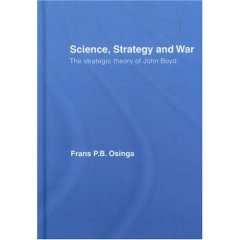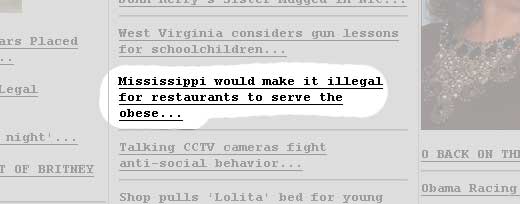By Wilf Owen
The central premise of this book is to explain the military thought of the late Colonel John Boyd. The intention is honest enough, and indeed it is somewhat extraordinary that ten years after the death of a man that so many have lauded as being a giant of late 20th century military thought, no one has previously attempted to do what this book succeeds in doing.
The fact that no one previously attempted such a task is to my mind indicative of John Boyd’s actual contribution to military thought. I admit to being a Boyd sceptic and this book merely confirmed all my doubts about his work, which I had harboured since reading the Coram and Hammond biographies. This book, like the biographies, is based on the premise that Boyd was an important and profound thinker on War. This is not a view I would share, but I concede he was vastly influential. Influential does not mean good. Was Boyd any good is the question the book should answer.
The book itself is a work of real scholarship. It is well written and well laid out, and Osinga does the best he can to make some of the more tedious aspects of Boyd’s work appear interesting. This is a not inconsiderable task given the nature of the material. It should be remembered that Boyd left no definitive published work. He did leave behind a vast pile of slides, papers and considerable personal library, and this is what forms his legacy. So unlike Sun-Tzu, Clausewitz, or even Machiavelli, there is no body of work to disseminate, critique and discuss. Despite this, he is constantly cited as being as the best brain behind the so-called transformation of the US military. The main problem I have with Osinga’s work is that this is just accepted, with no examination of the evidence that Boyd is worthy of all the accolades that are heaped upon him. While the work does illustrate the detail of Boyd’s military thought, I found myself writing “so what” in the margins far too many times. Those who are convinced of the efficacy of the OODA loop, will find much to aid in the defence of their position, while those of us who see no merit in the idea, are left un-swayed. Such is the nature is of military thought with all it’s human and intellectual impedimenta.
At the end of the day, you are still left with highly complex, arcane and somewhat pointless body of work, which is of dubious merit to either a student or practitioner of the military profession. Boyd undoubtedly knew and understood more about fighter air to air combat than almost anyone else in the USAF, but this insight did not translate to an understanding of land warfare and strategy in general.
The most intriguing part of the work is the revelation that Boyd was strongly influence by Basil Liddell-Hart and his work on the “Strategy of the Indirect Approach.” What Boyd, seemed to be unaware of, what that Liddell-Hart is a figure of some considerable controversy, as the works by Brian Bond, J.P. Harris and John Mearsheimer have clearly shown. Liddell-Hart probably did more harm than good, and might even provide a case study in the dangers or tampering with national defense policy, while unhindered by data or deep understanding. Add to this any informed analysis of the “Strategy of the Indirect Approach,” and it would seem that Boyd was greatly influenced by at least one thinker of dubious merit. I had always believed that Boyd started with a clean sheet of paper and studied military history with a view to identifying common patterns of success. Osigna’s research seems to indicate this is not so. Boyd seems to have embraced the inter-war polemicists, such as Liddell-Hart, Fuller and even T.E. Lawrence, certain that their insights may hold some kind of truth. To accept Lawrence, as having some kind of insight is particularly odd, unless one is prepared to give General Allenby more, if not at least equal, merit. Indeed Osinga’s work mentions Lawrence some 37 times while never once mentioning Allenby. Critically this might indicate that Boyd swallowed whole, Liddell-Harts self-serving criticism of Allenby.
However, my scepticism of Boyd’s contribution and the value of his work will be entirely irrelevant to an audience largely convinced of his sagacity. At the end of the day, those who believe John Boyd to be a great military thinker will merely cite this work as demonstrating it. Indeed I would suggest the Boyd’s reputation was built largely on the reaction of the audiences, and thus fan base, to his many lengthy presentations. That reaction was that an elderly and clearly well read Air Force Colonel an combat veteran had to be saying something profound and his citing of works that, at the time, almost certainly none of his audience had read (in the pre-internet book finding and .pdf age) merely contributed to image that they were standing at the feet of an intellectual giant. Everybody wants to love an outlaw, critique and radical thinker. “In the kingdom of the blind the one-eyed man is king”. This is in no way to suggest that Boyd was a fraud or that all of his audiences were stupid. They merely formed opinions that existed in isolation from ideas and information that would have challenged Boyd’s insights. The British military thinker, Brigadier Richard Simpkin pre-deceased Boyd by eleven years and one year after the publication of his magnum opus Race to the Swift. The size of the work, combined with the rank and the death of its author seemed to convince a whole generation of British and US Army officers that the work had un-questioned merit. Thus, it is of note, that Simpkin, an extremely well-known and widely published student of Deep Operations Theory, and thus it’s illegitimate step child, manoeuvre warfare, is not mentioned in Osinga’s work once. Indeed Simpkins views on Maneuver warfare are some of the most useful there are, yet it seems to have made no impact on Boyd’s work, or none that seems worthy of mention. This, in itself, is incredible. Even more so, in that Simpkin mirrored Boyd’s use of the language of science, and specifically physics, to create analogies he deemed useful to military theory (as did Clausewitz!).
The merit of this book is that it contributes to a necessary debate on the perceived relevance of John Boyd to useful modern military thought. To my mind, this debate is long overdue, as Boyd’s ideas are often cited as being the foundation of a whole raft of vastly dubious concepts such as Maneuver Warfare, Effects Based Operations, Fourth generation warfare and even Distributed Operations. Military thought should be the product of logic, and empirical evidence. Indeed the faults in Boyd’s work, like many other military thinkers, lies in its selective use of evidence to support pre-existing conceptions of how something might be done better, and then branding this as insight, instead of confirmation of what we already knew. Ultimately, the thought itself becomes irrelevant to the human need to have a hero to follow or a bright new idea to cling to. Boyd contribution is to provide that in abundance, and this work succeeds in providing what should be judged a generally accurate analysis of the material that supports those beliefs.
Mr. Owen is the Editor of Asian Military Review.
Previous Roundtable Posts:
Click here to view all posts in this discussion.

